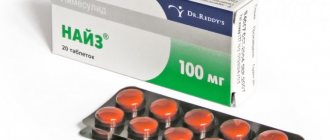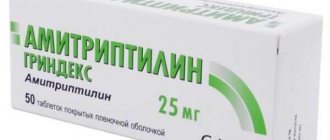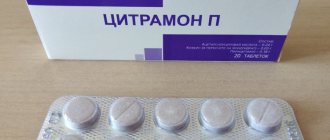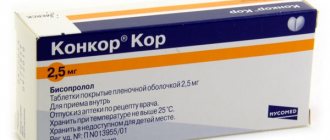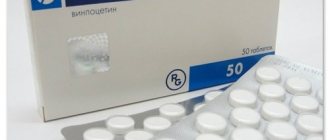Active substance and release forms
The active component of the drug is a derivative of phenylpropionic acid - ibuprofen.
The drug is produced in the form of tablets (200 and 400 mg each), extended-release capsules (300 mg each), as well as in the form of a suspension and syrup for children. 5 ml of suspension contains 100 mg of ibuprofen. For topical use, rectal suppositories are produced, and for external application - gel and ointment (5%).
Tablets are supplied in blisters (10 pcs.) and polymer bottles (50 pcs.).
note
The suspension can be given to babies from 3 months of age.
Reduced effectiveness of Ibuprofen
The use of alcohol together with Ibuprofen not only shortens the duration of action of the drug, but also leads to a concentration of toxic substances in the body. Alcohol completely neutralizes the active substance, and the effect of the drug is practically absent.
Sources:
Vidal : https://www.vidal.ru/drugs/ibuprofen__11526 GRLS : https://grls.rosminzdrav.ru/Grls_View_v2.aspx?routingGu >
Found a mistake? Select it and press Ctrl + Enter
Our readers successfully use Artreid to treat joints. Seeing how popular this product is, we decided to bring it to your attention. Read more here...
One of the most common remedies is Ibuprofen for headaches. Most of the population suffers from headaches. Mostly people resort to painkillers.
General information about the drug
Ibuprofen is considered a non-steroidal anti-inflammatory drug and has antipyretic and analgesic effects. After taking the tablet, a minute later it dissolves in the stomach. After 5 - absorption into the intestines and stomach walls occurs. And after 10 minutes, the anti-inflammatory effect begins, and the pain syndrome subsides.
Ibuprofen can be classified as an effective and safe pain reliever. It is also well tolerated by the body. It has many analogues and dosage forms, which are preferred by many people around the world. Once in the body, the tablet suppresses the activity of the enzyme cyclooxygenase, that is, it blocks the formation of inflammation. The pain weakens and completely disappears. This enzyme is considered the main one in the metabolic process. Ibuprofen tablets do not contain preservatives. They contain sucrose.
Among the many ibuprofen analogues, the main ones stand out:
- Classic, it contains 200 ml of Ibuprofen. For mild to moderate pain, this drug is recommended.
- Express, it acts much faster than the classic one, it is used for severe headaches.
- Forte contains a double dose of Ibuprofen, it is recommended in the treatment of migraines.
How to take the medicine?
Before you start taking any pills, you need to carefully read the instructions.
This medicine should be taken after meals. Take the tablet with a small amount of water. Take 1 tablet 3 times a day.
Cases in which you should not take Ibuprofen:
- For diseases of the gastrointestinal tract, heart failure and kidney diseases, as well as for children under 6 years of age.
- Damaged blister of new packaging.
- If you have allergic reactions to some components of Ibuprofen;
- Late term pregnancy.
- Do not exceed the permissible doses; discuss taking pills for more than 3 days with your doctor;
- You need to know that combining alcohol and Ibuprofen can lead to liver dysfunction.
- Effect on the nervous system - dizziness, impaired vision and sleep.
- On the digestive system - the presence of nausea, vomiting, diarrhea, possible damage to the gastrointestinal tract, and with long-term use, liver damage may occur.
- Effect on the circulatory system - with prolonged use, anemia is possible.
- With long-term use, renal function may be impaired.
- Allergic reactions are possible.
A little bit of history.
The drug was released in 1962. Its first name is Brufen. It was synthesized by John Nicholson and Stuart Adams. It was used in the treatment of rheumatoid arthritis. And in 1974, in the United States of America, it was used as an antipyretic and pain reliever under the name Motrin. During these years it was sold only by prescription. And already in 1983 in the UK it began to be sold without a prescription. In 1985, the company that produced this drug received the Queen's Award for Scientific and Technical Achievement. Ibuprofen is now used in more than 120 countries around the world.
When is it recommended to take Ibuprofen?
The main indication for use is pain due to inflammation.
Diseases and pathological conditions for which Ibuprofen is prescribed:
- migraine;
- toothache;
- rheumatoid arthritis;
- Bekhterev's disease;
- gout;
- osteoarthritis;
- neuralgia;
- myalgia;
nephrotic syndrome;- feverish reaction due to colds and acute respiratory viral infections;
- fever after immunization (vaccination);
- vertebral artery syndrome;
- painful periods (algomenorrhea);
- primary dysmenorrhea;
- inflammation of the appendages (adnexitis);
- inflammation of the joint capsule (bursitis);
- post-traumatic pain;
- postural hypotension.
As an additional remedy, Ibuprofen is prescribed for tonsillitis, rhinosinusitis, laryngitis, bronchitis and pneumonia.
Ibuprofen - indications for use
Many have heard of the drug Ibuprofen - not everyone knows what these pills are for. However, even those patients who know what Ibuprofen helps with should read the instructions before use. The package insert details all the indications for use of the medicine:
- As an analgesic and anti-inflammatory agent: in the treatment of rheumatoid arthritis, spondylitis, osteoporosis, and other joint diseases.
- For the treatment of non-rheumatic inflammatory processes - inflammation of the membranes of the joint, bursitis, tendinitis.
- As a pain reliever for sprained ligaments.
As a symptomatic treatment of painful conditions such as:
- dysmenorrhea;
- headache;
- toothache;
- pain in the lower back and back;
- fever due to acute respiratory viral infections and acute respiratory infections.
In what cases is the drug contraindicated?
Ibuprofen should not be used if you are hypersensitive to the active ingredient or additional ingredients.
The drug is contraindicated for the following diseases and disorders:
- intolerance to salicylates and other NSAIDs;
- "aspirin triad";
- erosions and ulcers of the gastrointestinal tract (in the acute phase);
- arterial hypertension (high blood pressure);
- bleeding in the gastrointestinal tract;
- enteritis and colitis (including Crohn's disease);
- poor blood clotting;
- traumatic brain injuries;
- condition after a stroke;
- amblyopia (weakened vision that cannot be corrected with optics);
- damage to the optic nerve;
- scotoma (“blind spots”);
- swelling;
- pathologies of the vestibular apparatus;
- condition after coronary artery bypass surgery;
- severe functional kidney failure;
- serious liver failure (including due to cirrhosis or hepatitis).
note
Ibuprofen tablets are not prescribed to children under 6 years of age.
How to take the drug correctly
Ibuprofen is available in the form of tablets, syrup and suspension, ointment and gel - for internal and external use. Each type differs in the amount of active substance in mg, degree of impact, indications and price. But, despite the large selection of forms of the drug, tablets remain among the most popular drugs.
According to doctors, Ibuprofen deserves attention as a drug that effectively and safely affects the body for pain of various etiologies. To avoid undesirable consequences, the use of the drug must be strictly controlled.
The dose of the drug is calculated depending on the amount of the active substance and the patient’s body weight - Ibuprofen is used no more than 3 times a day, one tablet with meals. It is recommended to take each tablet with water.
Dosage regimen and recommended doses
For children from 6 to 12 years old, Ibuprofen tablets should be prescribed by a pediatrician. A single dose is no more than 200 mg, and the frequency of administration is no more than 4 times a day at intervals of 6 hours . Medicine in tablets is allowed to be used if the child’s body weight is ≥ 20 kg. The permissible daily dosage is no more than 30 mg per 1 kg of weight.
A single dose for adults and adolescents from 12 years of age is 200 mg, and the frequency of administration is 3 times a day, with a time interval of 4 hours. To speed up the development of the analgesic and antipyretic effect, it is permissible to take 400 mg at a time (no more than 3 times a day). It is not recommended to take more than 1200 mg of medication in 24 hours. For the fastest absorption of the active substance in the morning, it is advisable to take Ibuprofen on an empty stomach with a sufficient volume of liquid. The duration of symptomatic therapy should not exceed 5 consecutive days. If there is a need to continue treatment, you must first consult with your local therapist.
note
To relieve pain due to rheumatoid arthritis, high doses may be required - 600-800 mg three times a day.
Ibuprofen for children
How often can children take Ibuprofen suspension? According to the general rules, this drug is used as follows:
- children receive syrup up to three times a day;
- the dosage is calculated according to the parameter 5-10 mg per kilogram of weight (more precise instructions are given in the instructions);
- For babies under one year of age, the drug can only be prescribed by a doctor;
- Each subsequent dose can be taken no earlier than 4-6 hours after taking the previous one.
How many days should children take Ibuprofen? According to the instructions, this drug should not be used for more than three to five days. In addition, exceeding the daily dose is not allowed.
pharmachologic effect
The drug non-selectively blocks the enzyme cyclooxygenase, thereby suppressing the biosynthesis of pain and inflammation mediators - prostaglandins.
Ibuprofen stimulates microcirculation, reduces the severity of the inflammatory response and suppresses platelet aggregation.
If Ibuprofen is taken before meals, the maximum serum concentration is recorded after 45 minutes, and after meals - after 1.5-2 hours. A higher concentration is created in the joint fluid than in plasma. Up to 90% of the substance is conjugated with blood serum proteins. Biotransformation with the formation of active metabolites occurs in the liver. The drug is excreted mainly in the urine.
Pharmacological properties
Ibuprofen is a member of the non-steroidal anti-inflammatory drugs (NSAIDs). It relieves pain, relieves fever and inflammation. Its pharmacological properties are explained by its ability to inhibit the activity of the enzyme, which is a precursor to prostaglandins. Namely, at the biochemical level they are the direct cause of pain, vasodilation and the appearance of a feeling of warmth.
Ibuprofen, when taken orally, is almost completely absorbed from the digestive tract. And if you combine the use of the drug with food, the absorption rate will slow down, so it is important to know how to take the drug correctly. Intermediate metabolites of chemical synthesis disintegrate and are neutralized by the liver by 90%. The half-life is 2-3 hours. Ibuprofen is excreted from the body primarily by the kidneys (80%) and also through the rectum (20%).
Side effects
Most patients tolerate Ibuprofen well. In case of hypersensitivity to the active component, allergic reactions in the form of urticaria, skin itching or angioedema are possible.
Possible side effects:
- headache;
- increased blood pressure;
- dizziness;
- psychomotor agitation;
- disturbance of consciousness;
- depression;
- pain in the abdominal area;
- dyspeptic disorders;
- anorexia (decreased or lack of appetite);
- deterioration of intestinal motility (constipation);
- dry mouth;
- aphthous lesions of the oral mucosa;
- erosions and ulcers of the digestive tract (bleeding is possible);
- inflammation of the pancreas;
- cardiopalmus;
- dyspnea;
- bronchospasm;
- liver dysfunction and toxic hepatitis;
- decreased hearing acuity;
- dryness of the conjunctiva of the eyes;
- transient visual impairment;
- diplopia (double vision);
- swelling;
- renal failure;
- increased diuresis;
- inflammation of the bladder mucosa;
- hyperhidrosis (excessive sweating).
note
Patients with diagnosed autoimmune pathologies are at risk of developing aseptic meningitis (inflammation of the meninges).
Blood tests may show anemia, leukopenia, and thrombocytopenia . Blood clotting often slows down.
Contraindications and possible side effects
Ibuprofen should not be prescribed to a child if he/she has:
- Hemophilia, hemorrhagic diathesis, and other blood diseases were revealed.
- A serious liver disease or kidney pathology has been diagnosed.
- An allergy to Ibuprofen, drugs from the same group or its constituent components has been detected.
- There are inflammatory and ulcerative diseases of the digestive tract, stomach or intestinal bleeding.
- Hearing loss or optic nerve disease.
For heart defects and diabetes mellitus in children, adjustment of the dosage prescribed in the instructions and increased attention from the pediatrician are required, as with any other chronic disease. For skin diseases such as weeping dermatitis and eczema, ointment and gel are not prescribed, and glucose-galactose malabsorption is a contraindication to the use of the suspension.
The following side effects may occur:
- From the digestive system - nausea and vomiting, loose stools, heartburn, stomach pain, flatulence.
- The medicine may cause headaches, tinnitus, vision and hearing problems. Parents often note that their baby experiences excessive anxiety and irritability, sleep disturbances, and increased excitability.
- The medication may increase blood pressure or cause tachycardia, affect kidney function, and reduce the number of blood cells in the body.
- An allergic reaction manifests itself in the occurrence of bronchospasms, rashes on the body, Quincke's edema, and runny nose.
- Aseptic meningitis.
We recommend: Miramistin for children
Overdose
If single or daily dosages are accidentally exceeded, the following symptoms may appear:
- nausea and vomiting;
- intense headache;
- acute renal dysfunction;
- mental retardation;
- drop in blood pressure;
- reduction in heart rate;
- atrial fibrillation;
- depression of respiratory function.
Important
An overdose can lead to coma, and in especially severe situations, in the absence of qualified assistance, to death.
Within an hour, the victim’s stomach should be rinsed, sorbents should be given inside, and plenty of alkaline fluids should be provided with parallel forced diuresis . According to indications, symptomatic therapy is also carried out. Acute poisoning and deterioration of the patient's condition is an indication for hospitalization.
Instructions for use of Ibuprofen tablets, dosage
The tablets are taken orally after meals with clean water.
The dosage is selected individually - it is necessary to use the smallest possible dose to obtain the desired therapeutic effect. Prescribed for adults and children over 12 years of age.
Standard dosages of Ibuprofen tablets according to the instructions for use:
- Adults - a single dose is 1-2 tablets (200-400 mg). The daily dose is 4-6 tablets (800-1200 mg), in divided doses with an interval of 4-6 hours. The maximum daily dosage is 1200 mg.
- Children over 12 years of age - a single dose is 1-2 tablets (200-400 mg). Therapeutic dose: 1-2 tablets with an interval of 4-6 hours. The maximum daily dose is 5 tablets. (1000 mg).
Effervescent tablets are prescribed for children over 6 years of age and adults. Standard dosages over 12 years are the same as for simple tablets.
Dosage for children aged 6 to 12 years – a single dose is 1 effervescent tablet (200 mg). Therapeutic dose – 1 effervescent tablet with an interval of 4-6 hours \ 2 to 4 times a day. The maximum daily dose is 4 tablets (800 mg).
If symptoms persist after taking the drug for 2-3 days, you should stop treatment and consult a doctor.
Side effects
The instructions warn about the possibility of developing the following side effects when prescribing Ibuprofen tablets:
- From the gastrointestinal tract: nausea, vomiting, NSAID gastropathy (decreased appetite, pain and discomfort in the epigastric region, abdominal pain), irritation, dry mucous membranes or pain in the oral cavity, ulceration of the gum mucosa, aphthous stomatitis, pancreatitis, constipation /diarrhea, flatulence, indigestion, possibly erosive and ulcerative lesions and bleeding from the gastrointestinal tract, impaired liver function.
- From the nervous system and sensory organs: headache, drowsiness, anxiety, nervousness, irritability, psychomotor agitation, confusion, hallucinations, aseptic meningitis (more often in patients with autoimmune diseases), hearing loss, ringing in the ears, reversible toxic amblyopia, unclear vision or double vision, dryness and irritation of the eyes, swelling of the conjunctiva and eyelids (allergic origin), scotoma.
- From the cardiovascular system and blood (hematopoiesis, hemostasis): heart failure, tachycardia, increased blood pressure, eosinophilia, anemia, incl. hemolytic, thrombocytopenic purpura, agranulocytosis, leukopenia.
- From the respiratory system: shortness of breath, bronchospasm.
- From the genitourinary system: edema syndrome, impaired renal function, acute renal failure, polyuria, cystitis.
- Allergic reactions: skin rash (erythematous, urticarial), skin itching, urticaria, allergic rhinitis, allergic nephritis, Quincke's edema, anaphylactic reactions, incl. anaphylactic shock, exudative erythema multiforme (including Stevens-Johnson syndrome), toxic epidermal necrolysis.
- Other: increased sweating, fever.
Contraindications
Ibuprofen is contraindicated in the following cases:
- hypersensitivity to the drug;
- exacerbation of gastric or duodenal ulcers and ulcerative colitis;
- diseases of the optic nerve and color vision impairment;
- “aspirin” asthma;
- arterial hypertension;
- scotoma;
- amblyopia;
- severe renal or liver dysfunction, as well as cirrhosis of the liver with portal hypertension;
- heart failure;
- swelling;
- hemophilia;
- hypocoagulation;
- leukopenia;
- pathologies of the vestibular apparatus;
- deficiency of glucose-6-phosphate dehydrogenase;
- 3rd trimester of pregnancy.
Prescribed with caution when:
- chronic heart failure,
- concomitant diseases of the liver and kidneys,
- enteritis;
- immediately after surgery;
- for dyspeptic symptoms before starting treatment;
- gastritis;
- colitis;
- children under 12 years of age.
With long-term use of Ibuprofen tablets, it is necessary to systematically monitor the peripheral blood picture, as well as the functions of the liver and kidneys.
Overdose
An overdose is accompanied by abdominal pain, nausea, vomiting, depression, drowsiness, headache, tinnitus, and increased heart rate.
Gastric and intestinal lavage, intestinal sorbents (activated carbon) and symptomatic therapy are administered. There is no specific antidote.
Interaction of Ibuprofen with other drugs
Concomitant use of other NSAIDs (including acetylsalicylic acid) should be avoided.
Ibuprofen potentiates the effect of thrombolytics and anticoagulants, as well as insulin and oral agents to lower blood glucose levels.
Sertraline, Citaprolam, and Fluoxetine increase the likelihood of bleeding in the digestive tract.
The likelihood of hepatotoxicity of Cyclosporine increases. The effectiveness of vasodilators decreases, as does the activity of diuretics (Hydrochlorothiazide, Furosemide, Lasix).
Steroid hormones, estrogens and colchicine increase the likelihood of gastrointestinal ulcers.
Caffeine can enhance the analgesic effect of Ibuprofen.
Ibuprofen during pregnancy
The drug should not be taken in the third trimester. In I and II, admission is allowed as prescribed by a doctor.
note
The use of widely used NSAIDs (including Ibuprofen) during pregnancy increases the risk of developmental pathologies in male children. The likelihood of cryptorchidism (undescended testicles) increases 16 times.
If it is necessary to carry out symptomatic therapy during lactation, it is advisable to temporarily transfer the baby to artificial milk formulas or use Ibuprofen parenterally, although a minimal amount of the active substance passes into breast milk even when treated with high doses.
Indications and contraindications
Ibuprofen is used to treat various diseases:
- inflammatory processes occurring in the area of the joints and spinal column, accompanying severe pain (arthritis, arthrosis, osteochondrosis, autoimmune processes). All these pathologies can have different origins, be infectious, bacterial in nature;
- moderate pain syndromes affecting the head (migraine), teeth, female genital organs (menstruation), muscles (myalgia), arising due to aseptic inflammation of the peripheral nerves;
- elimination of pain caused by injuries or surgery;
- an increase in body temperature above the physiological norm, accompanied by severe infectious intoxication of the body (signs of an acute respiratory viral infection).
Tablets and other dosage forms of Ibuprofen are used only as symptomatic therapy; they do not have the ability to eliminate the causes of the pathological condition.
The use of tablets containing ibuprofen is not indicated for all categories of patients; there are a number of conditions when such drug therapy is prohibited.
Contraindications to the use of Ibuprofen:
- intolerance to the main or auxiliary components of this drug, which is individual in nature;
- Stevens Johnson syndrome, toxic reaction;
- individual intolerance to NSAIDs, gastropathy, abdominal pain, nausea, vomiting;
- allergic reactions (hay fever, bronchial asthma, rashes) to taking acetylsalicylic acid, also related to non-steroidal anti-inflammatory drugs;
- pathological processes on the part of the gastrointestinal tract, with ulcerative lesions of the mucous membrane (at the same time the risk of bleeding increases);
- recovery period after a recent coronary artery bypass surgery;
- diseases of soft tissues with ulcerative lesions;
- inflammatory bowel processes;
- problems with normal blood clotting;
- heart failure, tachycardia;
- acute period of pathological conditions on the part of the liver, insufficiency of the functions of this organ;
- stroke, heart attack, suffered recently;
- pregnancy period (the drug may be approved by the doctor);
- children under 6 years of age (for tablets).
Use Ibuprofen mono with caution in the presence of the following conditions:
- elderly age;
- cardiac, hepatic, renal failure of moderate severity.
Additionally
Important
When taking Ibuprofen, special care should be taken in elderly patients, as well as persons suffering from chronic heart failure, cerebrovascular diseases, diabetes mellitus, and lipid metabolism disorders.
It is strongly recommended to use drugs in minimally effective doses. The shorter the course duration, the lower the likelihood of side effects. Long-term (over 5 days) therapy requires monitoring of the peripheral blood picture and the functional activity of the kidneys and liver.
If gastrointestinal symptoms appear, it is necessary to conduct a FGS and a stool test for occult blood.
During treatment, it is important to refrain from drinking alcohol and medicinal alcohol tinctures to avoid liver damage.
During the period of symptomatic therapy with Ibuprofen, it is not recommended to drive vehicles or operate other potentially dangerous mechanisms, since some patients may experience a weakening of the ability to concentrate.
How to use Ibuprofen correctly?
In order for the drug to give results on time and act with maximum efficiency, you need to remember the principles of using this type of product. This is especially true for the use of Ibuprofen in children under 3 years of age.
For the youngest (3-24 months), rectal suppositories are recommended: from them, the active substance enters the blood much faster. And due to the fact that the medicine does not pass through the gastrointestinal tract, it causes less side effects. Ibuprofen suppositories begin to reduce the baby’s temperature within 30-40 minutes. Moreover, they are used when the temperature is above 38.5 degrees (if there is a tendency to seizures or heart pathology - 37.5). In children with high susceptibility, the effect lasts up to 7 hours.
If Ibuprofen is used for pain in the throat, ear, etc., then children are prescribed syrup, not suppositories.
In adults, tablets are used for inflammation, viral diseases with high fever, headaches and toothaches. It is important to consider that Ibuprofen does not affect the cause of unpleasant symptoms, and also has a negative effect on hematopoiesis, the state of the gastrointestinal tract, and the liver. For this reason, the medicine should not be taken for longer than 5 days. There is an interval of 6 hours or more between tablets.
In order for the tablet to work faster, it should be taken before meals. For stomach diseases, this is done half an hour after eating.
The effect of Ibuprofen is greatly reduced if alcohol is taken in parallel with it (this also increases the load on the liver). In some cases, Paracetamol is first used in children, and then, after a few hours, the child is given Ibuprofen. This combination is allowed only at high temperatures, which are difficult to break down.
Ibuprofen analogs
The following drugs are analogues of the active component:
- Mig 400;
- Advil;
- Nurofen;
- Ibuprom;
- Dolgit;
- Solpaflex;
- Ibuklin;
- Burana;
- Deblock.
Plisov Vladimir, doctor, medical observer
14, total, today
( 162 votes, average: 4.54 out of 5)
Loenzar-sanovel 30 mg: instructions for use, manufacturer, analogues
Amoxiclav and alcohol: compatibility, how long after you can drink, consequences of use
Related Posts
Why is ibuprofen dangerous?
According to the latest medical data, ibuprofen, which is prescribed to patients after a myocardial infarction, can provoke serious consequences. Danish scientists have been conducting research on the effects of this drug for seven years. As a result, it turned out that 16% of people who used this medicine after a myocardial infarction had an attack again. But the worst thing is that in 30% of patients who had a myocardial infarction the day before, the use of ibuprofen led to death.
It is equally important to know that ibuprofen and alcohol are incompatible , since their simultaneous effects on the liver can contribute to disruption of its functions. Other contraindications for the use of this drug include peptic ulcer of the duodenum and stomach, dysfunction of internal organs. Additionally, there is no consensus on whether ibuprofen can be taken during pregnancy or not.
We recommend reading:
